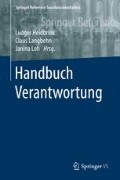Zusammenfassung
Der Artikel behandelt den Zeitraum zwischen dem frühen 16. und dem beginnenden 19. Jahrhundert, berücksichtigt also noch Hegel. Er beginnt mit Erasmus von Rotterdam und Luther, behandelt Verantwortung im Kontext der Theodizee und thematisiert vor allem die unterschiedlichen Interpretationen von Freiheit in ihrer Beziehung zur Naturnotwendigkeit. Die Kantische Philosophie markiert gewissermaßen den Ausklang neuzeitlichen Denkens, während Hegel die problematischen Aspekte in der Beziehung zwischen Vorsatz und Handlung hervorhebt.
Access this chapter
Tax calculation will be finalised at checkout
Purchases are for personal use only
Literatur
Bayle, Pierre. 1697. Dictionnaire historique et critique, 2. Aufl. Rotterdam: Leers.
Buddeus Johannes Franciscus [mit Georgius Christianus Knoerrius]. 1712. Doctrinae orthodoxae de origine mali contra recentiorum quorundam Hypotheses modesta assertio. Jena: Müller.
Campe, Joachim Heinrich. 1807–1812. Wörterbuch der Deutschen Sprache, 5 Bände. Braunschweig: Schulbuchhandlung (Hildesheim/New York: Nachdruck/Olms 1970).
Castel, Louis Bertrand. 1737. Essais de théodicée sur la bonté de Dieu, la liberté de l’homme et l’origine du mal, par M. Leibnitz. Mémoires de Trévoux, 37:6–36, 198–241, 444–471, 954–991.
Crusius, Christian August. [1744] 1969. Anweisung, vernünftig zu leben. In Die philosophischen Hauptwerke, Hrsg. Giorgio Tonelli, Bd. I. Hildesheim: Olms.
Crusius, Christian August. [1743] 1987. Dissertatio philosophica de usu et limitibus principii rationis determinantis, vulgo sufficientis. In Die philosophischen Hauptwerke, Hrsg. Sonia Carboncini und Reinhard Finster, Bd. V. 1, 183–204. Hildesheim: Olms.
Erasmus. [1524] 1988. Vom freien Willen, Hrsg. Otto Schurnacher, Bd. V. 1. Göttingen: Vandenhoeck und Ruprecht.
Grimm, Jacob, und Wilhelm. 1854–1961. Deutsches Wörterbuch, 16 Bände. Leipzig: Hirzel.
Hegel, Georg Wilhelm Friedrich. [1821] 1970. Grundlinien der Philosophie des Rechts. In Werke, Hrsg. Eva Moldenhauer und Karl Markus Michel, 20 Bde, Bd. 7. Frankfurt a. M.: Suhrkamp.
Hobbes, Thomas. [1646] 1839–1845. Of liberty and necessity. In The English works, Hrsg. W. Molesworth, 11 Bde, Bd. IV, 229–279. London: Bohn.
Hume, David. [1739–40] 2000. A treatise of human nature, Hrsg. Lewis Amherst Selby-Bigge und Peter Harold Nidditch. Oxford: Clarendon Press.
Hume, David. [1748] 2000. An inquiry on human understanding, Hrsg. Tom Beauchamp. Oxford: Clarendon Press.
Kant, Immanuel. [1781–87] 1968. Kritik der reinen Vernunft. In Kants Werke. Akademie Text-Ausgabe, 11 Bände, Bd. III-IV. Berlin: de Gruyter (zitiert nach der ersten A- und der zweiten B-Ausgabe)
Kant, Immanuel. [1785] 1968. Grundlegung zur Metaphysik der Sitten. In Kants Werke. Akademie Text-Ausgabe, 11 Bände, Bd. IV, 385–464. Berlin: de Gruyter.
Kant, Immanuel. [1788] 1968. Kritik der praktischen Vernunft. In Kants Werke. Akademie Text-Ausgabe, 11 Bände, Bd. V. Berlin: de Gruyter.
Kant, Immanuel. [1792] 1968. Die Religion innerhalb der Grenzen der bloßen Vernunft. In Kants Werke. Akademie Text-Ausgabe, 11 Bände, Bd. VI, 1–202. Berlin: de Gruyter.
Kant, Immanuel. [1797] 1968. Die Metaphysik der Sitten. In Kants Werke. Akademie Text-Ausgabe, 11 Bände, Bd. VI, 203–494. Berlin: de Gruyter.
Locke, John. [1690] 1975. Essay on human understanding, Hrsg. P. Nidditch. Oxford: Clarendon Press.
Leibniz, Gottfried Wilhelm. [1703 (publ. 1765)] 1875–90. Nouveaux essais sur l’entendement humain. In Die philosophischen Schriften, Hrsg. Carl Immanuel Gerhardt, 7 Bände, Bd. 4. Berlin: Weidmann.
Leibniz, Gottfried Wilhelm. [1710a] 1875–90. Discours préliminaire de la conformité de la foi avec la raison. Essais de théodicée sur la bonté de Dieu, la liberté de l’homme et l’origine du mal. In Die philosophischen Schriften, Hrsg. Carl Immanuel Gerhardt, 7 Bände, Bd. 6. Berlin: Weidmann.
Leibniz, Gottfried Wilhelm. [1710b] 1875–90. Essais de théodicée sur la bonté de Dieu, la liberté de l’homme et l’origine du mal. In Die philosophischen Schriften, Hrsg. Carl Immanuel Gerhardt, 7 Bände, Bd. 6. Berlin: Weidmann.
Luther, Martin, Hrsg. [1525] 1908. De servo arbitrio. In Werke. Kritische Gesamtausgabe, Bd. 18. Weimar: Böhlau.
McKeon, Richard. 1957. The development and the significance of the concept of responsibility. Revue internazionale de philosophie XI:3–32.
von Proschwitz, Gunnar. 1965. Responsabilité. L’idée et le mot dans le débat politique du XVIIIe siècle. In Xe Congrès Internationale de Linguistique et Philologie Romanes, Bd. I, 385–397. Paris: Klincksieck.
Pufendorf, Samuel. 1672. De jure naturae et gentium libri octo. Frankfurt/Leipzig: Knoch-Enslinger.
Pufendorf, Samuel. 1996. Briefwechsel, Hrsg. Detlef Döring. Berlin: Akademie Verlag.
Reid, Thomas. [1788] 1863. Essays on the active powers of man. In The works, Hrsg. W. Hamilton, 2 Bände, Bd. II. Edinburgh/Stewart/London: Maclachlan/Green.
Ricoeur, Paul, Hrsg. [1994] 1995. Le concept de responsabilité. Essai d’analyse sémantique. In Le juste, 41–70. Paris: Esprit.
Thomasius, Christian. [1705] 1979. Fundamenta juris naturae et gentium, repr. Nachdruck der zweiten Ausgabe 1718, Aalen: Scientia.
Walch, Johann Friedrich. 1726. Philosophisches Lexikon. Leipzig: Hirzel.
Zedlers Universallexikon. 1731–1754. 64 Bände. Halle und Leipzig: Zedler.
Author information
Authors and Affiliations
Corresponding author
Editor information
Editors and Affiliations
Rights and permissions
Copyright information
© 2017 Springer Fachmedien Wiesbaden GmbH
About this chapter
Cite this chapter
Fonnesu, L. (2017). Der Begriff der Verantwortung in der Neuzeit und in der Aufklärung. In: Heidbrink, L., Langbehn, C., Loh, J. (eds) Handbuch Verantwortung. Springer Reference Sozialwissenschaften. Springer VS, Wiesbaden. https://doi.org/10.1007/978-3-658-06110-4_6
Download citation
DOI: https://doi.org/10.1007/978-3-658-06110-4_6
Published:
Publisher Name: Springer VS, Wiesbaden
Print ISBN: 978-3-658-06109-8
Online ISBN: 978-3-658-06110-4
eBook Packages: Social Science and Law (German Language)

